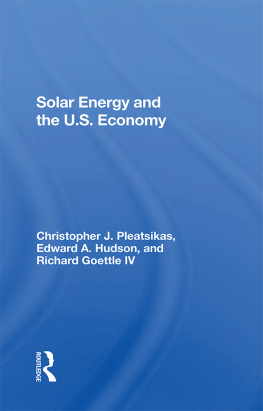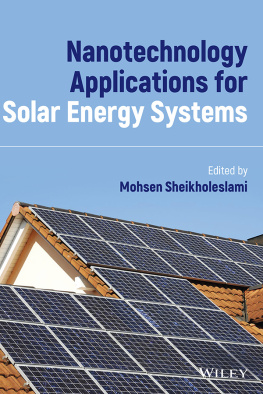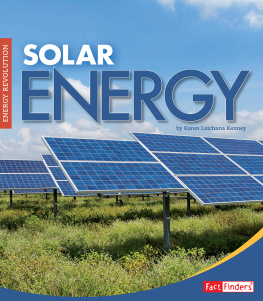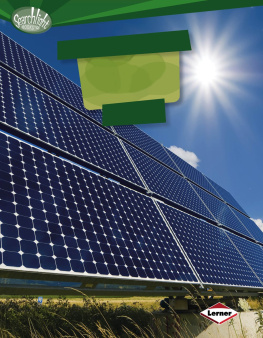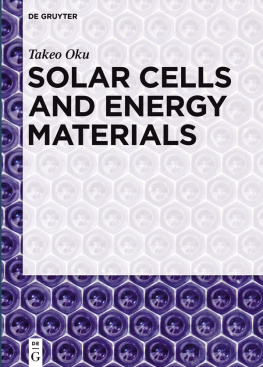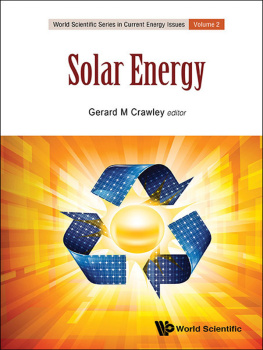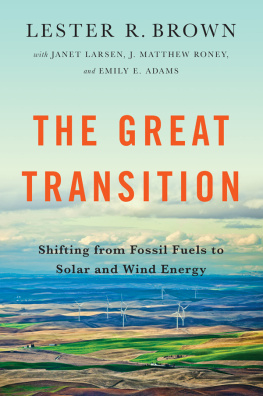Solar Energy and the U.S. Economy
Acknowledgments
The authors would like to thank the following people for their assistance in researching, writing, and editing this book: Adele Baden, Roger Bezdek, Christopher Dunn, Douglas Funkhouser, Thomais Karidoyanes, John A. Lewis, Malcolm Persen, Patrick Peracreta, and Sherri L. Rose.
First published 1982 by Westview Press
Published 2019 by Routledge
52 Vanderbilt Avenue, New York, NY 10017
2 Park Square, Milton Park, Abingdon, Oxon OX14 4RN
Routledge is an imprint of the Taylor & Francis Group, an informa business
Copyright 1982 Taylor & Francis
All rights reserved. No part of this book may be reprinted or reproduced or utilised in any form or by any electronic, mechanical, or other means, now known or hereafter invented, including photocopying and recording, or in any information storage or retrieval system, without permission in writing from the publishers.
Notice:
Product or corporate names may be trademarks or registered trademarks, and are used only for identification and explanation without intent to infringe.
Library of Congress Cataloging in Publication Data
Pleatsikas, Christopher J.
Solar energy and the U.S. economy.
(A Westview replica edition)
1. Solar energy--Economic aspects--United States. 2. Energy policy-
Economic aspects--United States. I. Goettle, Richard. II. Hudson, Edward A.
III. Title.
HD9681.U62P56 338.5'443'0973 81-23970
AACR2
ISBN 13: 978-0-367-28790-0 (hbk)
1
Introduction
Twice during the 1970s -- the Arab Oil Embargo of 1973-74 and the tight oil market of 1978-79 associated with the political upheaval in Iran -- the U.S. economy experienced severe shocks as a result of massive price increases for imported oil. By 1980 the price for imported crude oil had increased to nearly twenty times the price in 1970 (about $40 per barrel in 1980 as compared to about $2 per barrel in 1970). The increased reliance on foreign sources for oil because of reduced domestic supply and increased domestic demand exacerbated the situation further. The effects on economic performance have been extremely serious. The rapid rise in energy prices was a major cause of the severe recession of 1974-75 and has contributed to sluggish economic performance since 1975. And prices will continue to rise as a result of the elimination of domestic oil price controls in 1981 and the planned phase-out of domestic natural gas price controls by 1985.
For a nation nearly self-sufficient in energy through the mid-1960s and whose economy was based upon cheap and abundant energy resources, the economic implications of rising energy prices cannot be ignored. The nation's reliance on expensive imported petroleum has severely strained our world balance of payments position, compromised our national security, and confronted the nation with difficult choices concerning future patterns of economic growth and energy consumption. Energy analysts may disagree about the magnitude of domestic energy resources and reserves, but there is little likelihood that domestic production of oil and gas (from conventional and unconventional sources) can be increased above current levels for any sustained period. Indeed, it is likely that domestic production of these fuels, which peaked in the 1970s, will continue to decline. Thus, given expectations of future growth in the economy and energy consumption, coupled with the current need for costly petroleum imports, the supply potential and associated economic impacts of alternative non-conventional energy supply technologies must be carefully evaluated.
Several courses of action are open to individuals, corporations, and public entities to adjust to the new conventional energy supply availability and price conditions. These include vigorous expansion of domestic coal, oil, and gas production as well as more rapid development of nuclear fission electric power. However, these courses of action will require an increased commitment of capital to recover resources which are increasingly expensive to exploit and may entail unknown, long-term damage to the environment. Another possible approach to the problem of scarce energy resources involves a commitment to improved energy efficiency and development of renewable energy resources, principally direct and indirect solar sources.
As an expression of commitment to this latter approach, the United States Congress, in October 1974, passed the Solar Energy Research, Development and Demonstration Act. The Act states that:
The urgency of the nation's critical energy shortages and the need to make clean and renewable energy alternatives commercially viable requires that the nation undertake an intensive research, development, and demonstration program...
Since that time the federal government has spent hundreds of millions of dollars on research, development and demonstration of innovative energy technologies, including solar and other renewable technologies.active and passive solar space heating systems). In addition, many other innovative technologies will reach the commercialization stage during the next twenty years. In order to develop long-range energy policies applicable to the 1980s and 1990s, it is imperative that the economic impacts inherent to the use of these innovative energy technologies be fully investigated.
The objective of the study is to assess the long-range national economic impacts of a large-scale commitment to solar technologies and to formulate a set of economically efficient policies toward these technologies.
In designing any U.S. energy policy for the next two decades, the effects of several factors must be taken into account. These include (but are not limited to) environmental considerations, national security, growth in Gross National Product (and other economic variables) and equity (distribution of benefits and costs across regions, racial/ethnic groups, and income groups). This study will investigate the macroeconomic implications over the next twenty years of a large scale solar/renewables energy investment program, including the impact on GNP, prices, and other measures of national economic performance. Thus, this study will provide information on one of the most important factors which needs to be considered in any comprehensive review and/or evaluation of different energy supply policy options.
It has been suggested by some energy analysts that a massive commitment to develop solar and other renewable energy technologies would have negative impacts on the national economy. This negative impact would be a direct result of the high capital costs of solar energy technologies compared to more "conventional" alternatives. These large capital requirements may divert capital from more productive investments. Proponents of solar and renewable energy counter that nuclear and coal-based energy supply technologies are at least as expensive as their solar counterparts, that imported oil drains our nation of needed capital, and that the manufacture and installation of solar technologies will provide much needed jobs for American workers.
To provide a basis for determining the macroeconomic effects of solar energy investments over the 1980 to 2000 time period, several related issues must also be considered:


